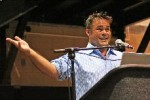Colorful speaker talks about gay’s acceptance

With six straight students called on stage and wrapped in rainbow boas, Shane Windmeyer spoke out against gay stereotypes at the Sun Dome Corral on Monday night.
Throughout his interactive program – sponsored by the University Lecture Series and titled “What is your Gay Point Average?” – the author and activist discussed serious lesbian, gay, bisexual and transgender (LGBT) issues with wit and humor.
The first half of his lecture centered on a set of four questions to test the extent of the audience’s gay knowledge.
“But it’s not as scientific as gay-dar,” Windmeyer said.
He asked audience members to name the colors of the gay flag, the geometric shape that represents the gay community, the Greek letter historically associated with homosexuals and three television or movie personalities who are gay and play straight, or vice versa.
In a playful demonstration, Windmeyer discussed the significance the answers to each question have for the LGBT community. He explained how the rainbow colored flag was meant to represent the diversity of the LGBT community; how the triangle, a symbol for gays since Nazi concentration camps, is now part of the Safe-Zone symbol for LGBT students; and how the Greek letter lambda has been used by gays as a representation of the synergy of LGBT people for years. When answering the final question, several of the students on stage mentioned shows like Will and Grace and Ellen, a response that Windmeyer said was typical.
“The LGBT community is very diverse when it comes to ethnicity and religion,” he said. “When we talk about characters like Jack, Will and Ellen, they are all white. We want the spectrum of diversity to be recognized in gays just like other people.”
The point of his exercise was to encourage the audience to look past the typical symbols of gay people, Windmeyer said.
On a more serious note, Windmeyer discussed the importance of supporting gay friends of family members.
“What would you do today if you found out that your best friend or family member was gay or transgender?” Windmeyer asked. “How would you make that person feel? Ultimately, if I can do one thing tonight, I want you to leave here with the answer to that question.”
Windmeyer said it was important for universities to look closely at how sensitive they are to LGBT issues.
“Gay issues should be a part of your college life regardless of whether or not you have any gay-out students,” he said. “Because the gay student is not going to come out unless they feel comfortable, and the only way they are going to feel comfortable is if the faculty and staff create programs that are actually LGBT-friendly.”
Windmeyer encouraged the students to register USF on the LGBT Climate Index in order for the university to be recognized and looked at by potential LGBT students.
In his final statement, Windmeyer addressed the need for straight people, gay people and their allies to work together.
“We all have a responsibility to reach out and to stand out for people who are silenced,” Windmeyer said. “Whether it is sexual orientation issues or gender identity and expression issues, take that responsibility and use it. Be powerful with your voices because we all should be to be together, not just as a human race, but as a community.”
Natalie Gagliordi can be reached at (813) 974-6299 or oraclegagliordi@gmail.com







